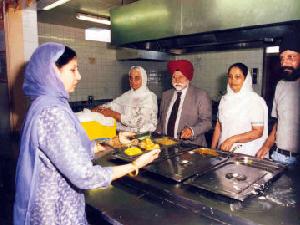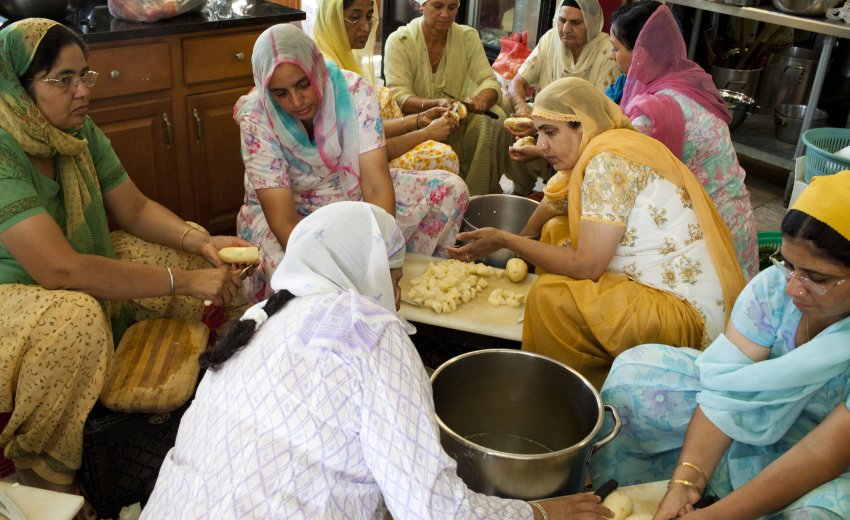 He is not separate from His Creation; so serving Him by serving what He has created is the ultimate duty of every Sikh. The Sikh often prays as did Guru Arjan Dev: `As Your servant, I beg for seva of your people, which is available through good fortune alone.'
He is not separate from His Creation; so serving Him by serving what He has created is the ultimate duty of every Sikh. The Sikh often prays as did Guru Arjan Dev: `As Your servant, I beg for seva of your people, which is available through good fortune alone.'
Seva or service occupies a central place in Sikhism where no worship is conceivable without seva. The spirit of service not only creates in one's heart love and affection for others but also helps the person overcome his ego, the main obstacle in the path of spiritual realisation. Service is suggested as a practical way of life for a Sikh and he is expected, among other things, to meditate on the Name of God and perform service for the welfare of humanity.
Service could be of any kind serving the poor and needy; giving charity, providing food or shelter, helping a person in distress, saving someone in danger or reading the scriptures for his solace or providing services for the common good. These acts are considered far superior to the countless sacrificial fires and performance of ceremonies or mere meditation and worldly knowledge, says Bhai Gurdas.
Seva can be rendered in any form through labour, feelings or material means. The first is considered as the highest of all and is prescribed for every Sikh. Dignity of labour is realised foremost in Guru ka Langar, the community kitchen, and in serving the sangat, the holy assembly. Langar is the unique way of combining worship with seva. One can contribute in cutting of vegetables, cooking of food, distribution of water and langar, washing of utensils, cleaning of the premises, taking care of footwear as well as in collection of rations. Langar, therefore, becomes a place of training in voluntary service and helps develop the notions of equality, hospitality and love for human beings. It makes you humble by helping you curb your ego. Humility is a special virtue recommended to the Sikhs. It can be acquired through seva. The Sikh prayer, Ardas, ends with a supplication for the welfare of all, 'Sarbat da Bhala'. The attitude of compassion should be combined with a practical way of serving God through His Creation.
Langar, therefore, becomes a place of training in voluntary service and helps develop the notions of equality, hospitality and love for human beings. It makes you humble by helping you curb your ego. Humility is a special virtue recommended to the Sikhs. It can be acquired through seva. The Sikh prayer, Ardas, ends with a supplication for the welfare of all, 'Sarbat da Bhala'. The attitude of compassion should be combined with a practical way of serving God through His Creation.
Seva through material means should be a silent and non-personal contribution. It is meant for the welfare of the community and the whole humanity and should be done in a way as to help dissolve one's ego. Even in serving others, one serves not the person concerned, but God Himself through him. Even as one feeds the hungry, it has been the customary Sikh practice to pray: 'The grain, O God, is your own gift. Only the seva is mine which please be gracious enough to accept.'
Service should be done without any expectation of reward. Desire for any reward in return turns it into a bargain and it ceases to be a service. 'He who serves without reward, he alone attains God'. True seva, as proclaimed by the Gurus, must be performed in humility, with purity of intention and without any desire for reward. Service is its own reward that leads to liberation. `We get eternal bliss through the service of God and merge in the peace of poise,' says the Guru Granth Sahib.
